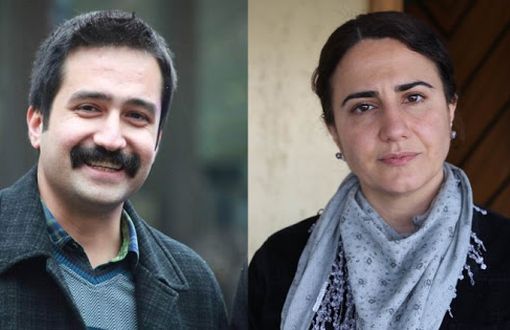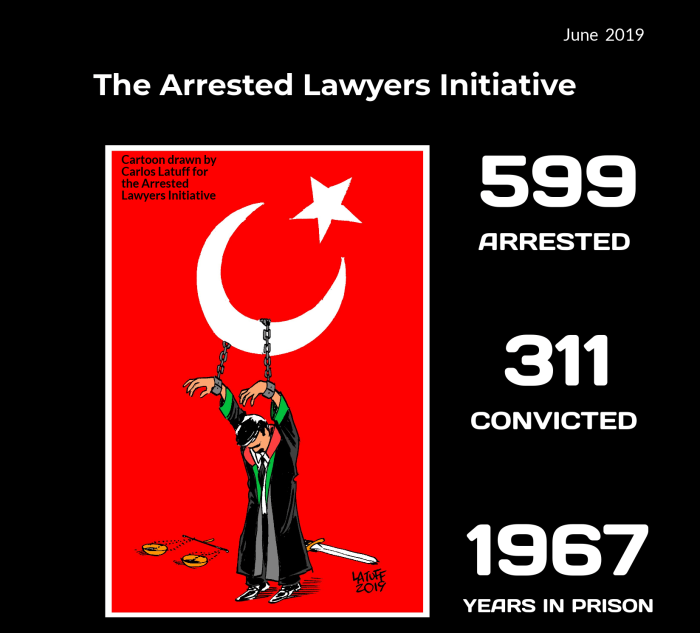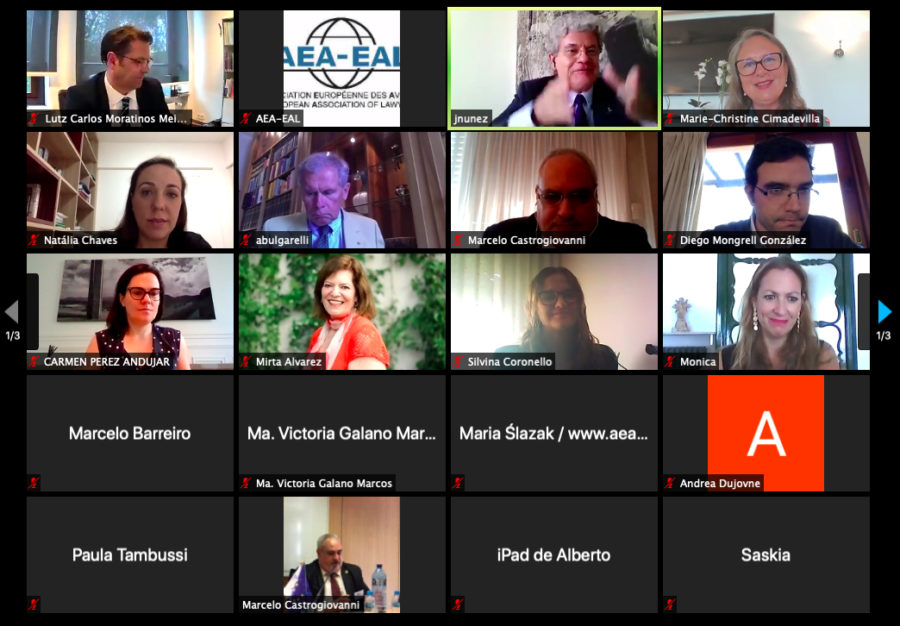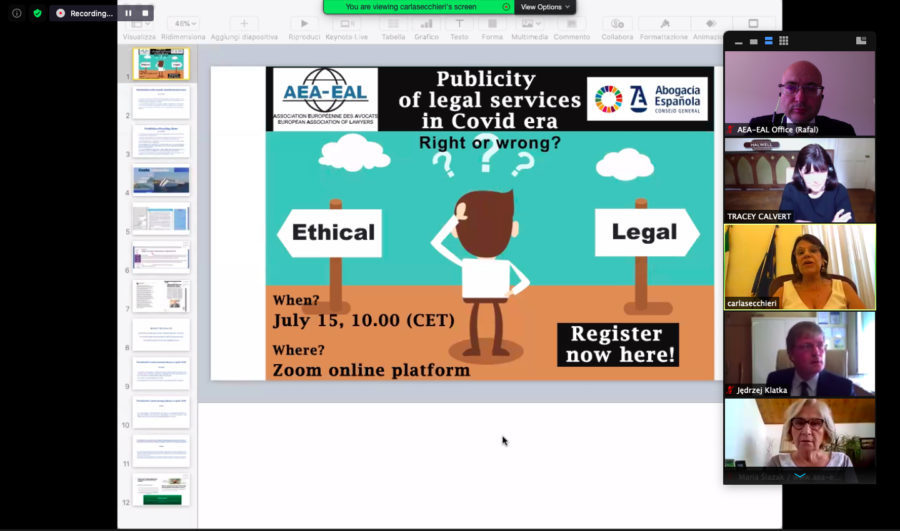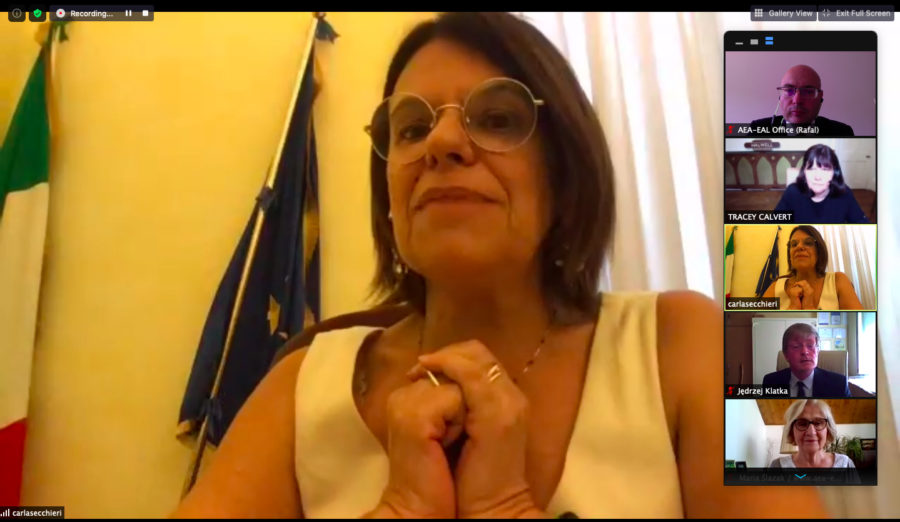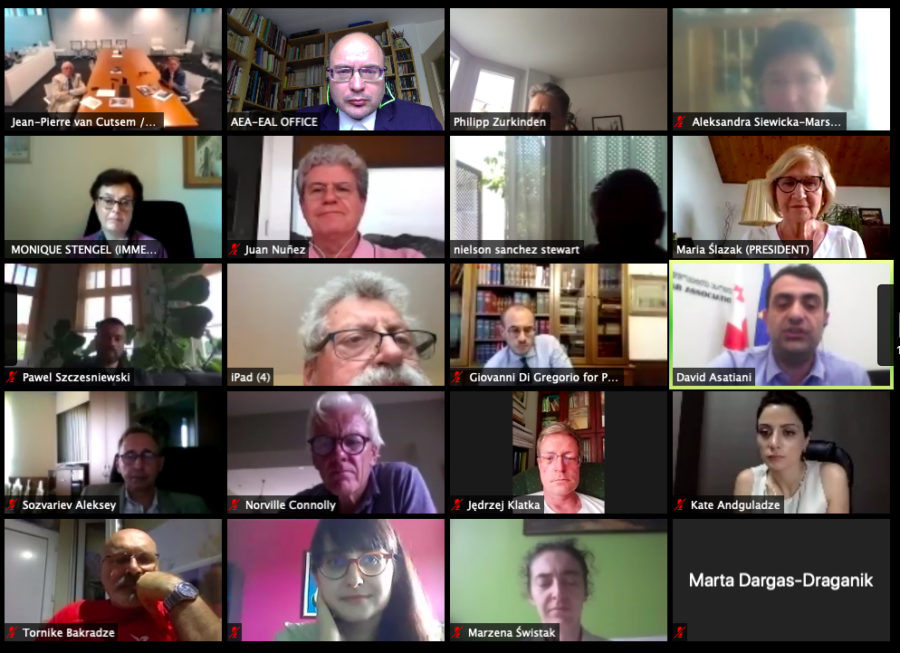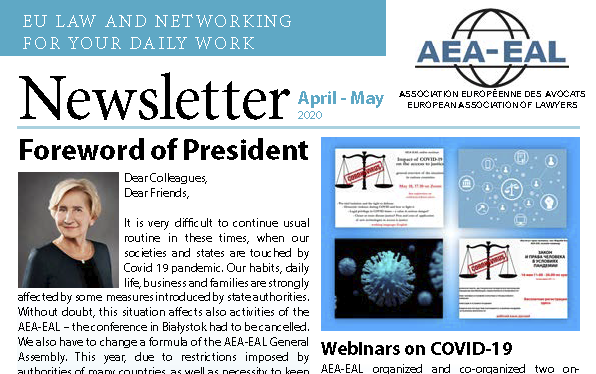July 15, 2020

Alex Tallon
The evolution that our society has known in the last forty years is impressive and mainly has to do with the development of new technologies. The question is to what extent this has already profoundly influenced the legal profession.
In the current organization of the law firm, the possibilities offered by these means of communication and the access that this makes possible to documentation and thus to knowledge must surely be taken into account and be implemented.
The Covid crisis has got this advantage that it has forced to accept and implement forms of co-working including the possibilities of teleworking and virtual meetings. This means however that, as far as law firms are concerned, these must change fundamentally their organization and also, in a certain way, their relationship with the clients. The manner to provide legal services must take into account the use of these technologies. These technologies allow various forms of digitization or dematerialization of the lawyer’s activities. The most extensive form of dematerialization consists of the paperless management of the office with the collaboration between the participants of the office on an Electronic Collaborative Platform (here abbreviated as ECP). Current contribution aims to review the possibilities that the new technologies allow for the organization of the law firms, their services to the client, the profitability of their activities, and how this should be accommodated within the application of our deontological rules.
A. The organization of a modern office
1. Influence of modern technologies
It is not disputed that our society has undergone tremendous evolution in the field of word processing, storage and communication technologies over the past 40 years. This evolution within society gives real meaning to the concept of the globalized world. Physical travel is no longer necessary to be in direct contact with the whole world. What’s more, relocations are no longer necessary to gain access to all of science and knowledge. The dangers of this are known. The control of the content and transfer of knowledge and documentation is nonexistent. But the generation brought up on these new technologies and making them their own approaches the world from this perspective.
These new technologies also affect services.
This of course applies to all practitioners of a liberal profession, from the architect to the physician. But above all, this applies to the legal profession. The reason for this is that the lawyer provides a service for which at first sight no special knowledge is required from the moment one has access to the applicable texts. In the current knowledge society in which everyone has, or at least can easily, access, or at least have access to, all laws and regulations, whatever their origin, the lawyer must clarify the added value he has to offer. Good and targeted use of these modern technologies is indispensable for this.
a. Organization of the office.
Modern technologies now allow access from anywhere in the world to the content of all files that are managed.
This of course requires working completely paperless.
An ECP office will therefore have to offer the option of digitizing all files.
To this end, an adapted archive management will have to be established, as well as a nomenclature, which makes it possible to request any document very quickly.
All useful documentation must be electronically accessible. This both internally (models and the like) and externally (access to databases and the like).
More than before, the necessary precautions will have to be taken regarding the preservation of the confidentiality of the data. However, the ECP office cannot close its eyes to the dangers of theft of its know-how and knowledge. Clear agreements must therefore be made with employees with regard to the transfer of copyrights, and the retention of data that may never be copied or carried over. Apart from the deontological aspects associated with it, every office must think carefully about the politics it wishes to pursue towards its employees.
This organization, made possible by modern technologies, is optimized by externalizing the digital storage of data and documentation, as well as all kinds of services related to the management of the software used, in other words through cloud computing. Importance must be given to secure the documents in the cloud.
b. Place of supply of services.
The law and the rules of the bar require that the lawyer has an office, which means a physical establishment in the district of the Bar Association where he is registered. He must be available at that office and have the necessary space to receive clients and keep his files.
A physical location now serves as a starting point to enable registration at the bar. However, it should be possible to request registration at a bar without providing a physical office address. Or at least it can be assumed that the lawyer’s place of residence can serve to determine the place of the bar where he can register.
One must also comply with the rule of uniqueness of the office. Does this ultimately make a lot of sense, now that people can work from anywhere in the world without there having to be any physical connection with the country from which one is supposed to work. For lawyers working in a partnership, this means that they must all be at the same address. In an ECP office, the bar should abandon this maxim. Indeed, in a world where IT allows communicating with anyone anywhere, it makes little sense to require lawyers who have decided to collaborate to also have a joint physical address. It would be advisable to take this (virtual) reality into account and to regard a joint electronic collaborative platform as a sufficient criterion to form a partnership. In that case of course with respect of the rules of conflict of interests.
c. The method of cooperation.
A law firm is primarily a group of people among whom the work that is entrusted by clients is distributed.
Assistance to the lawyer in the management of an electronic file is not of the same nature in an ECP office. These new tasks must be completed and must also be used optimally. It requires a thorough adjustment.
But cooperation with intellectual input must also be adapted to the electronic management of the office. Working with an electronic collaborative platform allows for great flexibility. Thus, more than before, the work can be delegated in an optimal way, with a more efficient and above all more reactive control, since the work is always fully available and controllable. The collaborative platform also makes it easy to collaborate on a file not only with two, but also with several people.
d. The service to the client.
The services of the lawyer mainly consist of quality and reactivity. The quality in itself mainly depends on the competence of the lawyer. The services in a paperless office can probably facilitate this quality by giving better access to documentation, closer control by the client (which one can grant access to the electronic file and thus the completed tasks), an optimization of the cooperation by to combine work force and experience.
Reactivity can also be optimized in an ECP office. The direct contact between client and service provider and the permanent possibility of exchanging information allow exceptional reactivity when compared to traditional working methods.
e. The execution of the service.
The traditional service consists of answering a legal question, editing contracts, assisting during proceedings. Most lawyers provide 'custom work’.
This has already been challenged in traditional offices by two evolutions: the specialization and the use of standard forms.
The electronic management of files and documentation allows law firms to create databases, so that they can fall back on work that has already been performed to provide an answer to the client.
These databases can also be made available to the client for a fee. The ability to provide more and more services as standard allows the profession to evolve from service to product provider. This fundamentally changes the legal profession, because the performance will have to focus more on updating data than on a file-related and specific answer to a legal question. The client will have access to the latter and will consult the law firm that can offer him the most reliable database.
This can also be optimized with the use of artificial intelligence. The challenge for law firms here is to gather sufficient financial resources to develop AI tools. Rather, it appears to be a task for lawyers’ organizations or partnerships based on mutualisation.
f. Access to knowledge.
Before the emergence of the world wide web, and the possibilities thus offered, access to knowledge in a certain matter was reserved for a few privileged people.
This time has passed. The knowledge is now available to everyone and immediately available. The question is what one does with this accessibility. In any case, expertise is still needed to actually convert this access to knowledge into usable knowledge.
The law firm can play a role in this. Internally by providing employees with the necessary tools to have electronic access to the most up-to-date documentation and, if necessary, their own database. The latter will certainly be part of an office’s intellectual value.
Externally through the exchange of data and knowledge with clients or even interested parties, whether or not for a fee.
2. The benefits
This organization offers several benefits to the lawyer and the client.
a. The cost of the service.
The elasticity of pricing of lawyers’ performance is high. The client is primarily interested in the quality of the work delivered.
However, the client is more sensitive than before to the cost of legal services. It must be admitted that this cost price is not cheap in the traditional working method.
So, there is undoubtedly an evolution going on, which is also influenced by computer science and social media, with the law firms also emphasizing the price-quality ratio of the services provided.
Because more and more work can be standardized, and because the presence on the net can also give greater visibility to more offices, competition is becoming more and more common, so that the rates can determine the choice of lawyer.
In the ECP office, fixed costs can be significantly reduced: teleworking allows the office space to be reduced significantly, the number of staff in charge of administrative tasks can also be reduced, in other words the costs of administrative support are reduced to a minimum.
This allows not to charge useless costs to the client.
For some specific performance, for some specific areas, the pricing is likely to be of little importance, and the reputation of the lawyer or firm is decisive for the choice of lawyer. However, this domain is shrinking and only applies to a small part of the legal market. For the remainder, and therefore for the most part, it will be important to demonstrate that quality is delivered at the lowest possible price. The development of an ECP office is undeniably an asset.
b. The quality of the service
Apart from this pricing, quality is of course important. This quality will always depend on the people who practice the profession. As a professional group, it therefore remains necessary to monitor the quality of the legal profession in general. Professional organizations can do little to nothing to provide a guarantee of this quality, to the extent that they must provide this guarantee. The client is therefore expelled on his own, and on what makes the reputation of some office or other. For this, people are increasingly focused on the comments in social media and the presence of lawyers or offices is not without importance. Ultimately, it is the market that provides insight into what is successful or not, and often, not always, this is accompanied by quality.
This quality is probably best framed in an ECP office and thus the principles of collaboration on an electronic platform:
– such an organization increases the reactivity of the lawyer; this to the great satisfaction of the client. The client thus has the impression that he has an in-house lawyer;
– the electronic collaborative platform makes it very easy to let a group of lawyers work together who, due to their diverse competences and experiences, can optimize the quality of the service.
c. The cooperation between the lawyers
The electronic collaborative platform is essential within the organization of the modern office. This increases the quality of the cooperation between the lawyer dominus litis of the file and often partner within the firm, and those who assist him in providing the legal services.
The absence of location-related services increases in practice the quantity and quality of the collaborative work in order to achieve the most efficient cooperation, with a view to the best possible execution of the mandate or answer to the legal question, and thus in the interest of the client.
d. The profitability of the law firm
The classically organized office suffers from numerous fixed costs. These undoubtedly have an influence not only on the price that can be attributed to the client, but also on the intrinsic profitability of the office.
An ECP office allows to reduce the fixed costs as much as possible. As a result, such an office has a high return on the final fee charged to the client.
e. The welfare of the lawyer
It is a widely recognized observation that today’s society generates more stress; the working comfort decreases rather than increases.
The choice that many offices have to make, regardless of the different levels of digitization, between the paper and the paperless office is probably no surprise. The compromise between the traditional working methods of the paper office and the various forms of working methods made possible by its dematerialization increases this stress, partly because double checking is required and there is a fear of mistakes or misunderstandings.
The resolute choice for an ECP office and the associated paper lessness, collaborative working methods and task management, allow for a more comfortable planning and execution of the work.
In particular, the electronic methods of task management take away the stressful aspect of an unidentifiable deadline. An electronic collaboration organization does not reduce the work or the deadlines but allows them to respond with greater serenity.
3. The disadvantages
A number of drawbacks, or at least risks, can be mentioned that are linked to this modern organization:
a. The remote and looser collaboration.
Cyberspace simultaneously creates a collaborative platform, but also an organization that is very much focused on the individual. This individualism must always be opposed, because it can degenerate into a trapped image. If the partnership is not always fueled by meeting moments – which may be electronic – there is a risk of losing contact and thus achieving the opposite effect from what is desired.
The ECP office must pursue an animation policy in various ways and develop a business model that strengthens the bond between the participants. This is also accompanied by building up a strong 'office brand’ (branding, communication) that also underlines the bond between the participants of the office for the clientele.
b. The blurred image for the client.
The modern office organization allows, in the extreme case, to manage files without ever having seen the client, let alone heard. This form of abstraction, and perhaps the absence of humanity, can create an impersonal image that is not conducive to customer loyalty. This must therefore be regularly answered and / or contested by building in moments for these personal contacts.
Building a strong 'office brand’ is therefore essential in order to convince the client of the cohesion of the participants of the ECP office.
c. Keeping the documents.
It should never be forgotten that there is still a need to keep the paper version of some documents, to preserve their evidential value. It is therefore necessary to combat the risk of losing valuable paper documents.
d. Loss of place binding.
Advice in legal matters often also has to do with identity and community. This can be interpreted culturally in different ways but is clearly location specific. The full digitization and non-location-bound office organization may ignore this cultural aspect, with all its consequences. Legal services remain a human matter, so it may also be related to the location of the persons requesting this legal service. The ECP office will therefore always have to take social and cultural considerations into account.
4. Is the modern office an ECP office?
The ECP office is therefore not a 'virtual office’ in the sense that it is not the second life version of a law firm. But it also allows it on the other hand. It is an organization that is fully committed to digitization and the use of the most modern techniques to practice as a lawyer.
Therefore, the modern office, the office of the future, is necessarily an ECP office. All offices have already opted for digitization but have almost never extended this to the organization itself of the working conditions.
It is this link that must be made to actually turn the law firm that uses a number of digitization techniques or modern technologies into a modern office.
There is a great degree of difficulty in moving from the traditionally organized office to an ECP office. A step-by-step transition to an electronic collaborative platform is almost impossible and requires taking so many obstacles that the outcome is uncertain. After all, it is not an evolution, but a true revolution in the organizational form of the office.
B. The deontological framework of the ECP office.
In every technological evolution, be it the telephone, the fax, the informatics, the mobile telephone, the legal profession has asked itself questions regarding the combination of this technology with the basic values of the profession. But too often people forget that technology is not an end in itself, but only a means of practicing the profession.
There is no choice in the field of tension between modernity and traditional values. Both must go together. Traditional values must not prevent modern interpretation of the way in which services are provided by a lawyer, at the risk of disappearing as a professional group.
1. Can modern technologies go hand in hand with safeguarding the core values of the profession?
This question should be examined mainly in the light of professional secrecy and the independence of the lawyer, the two core values that are sometimes said to be challenged when using modern technologies.
a. Professional secrecy.
The legal profession requires the respect of the professional secrecy as a foundation of the lawyer’s statute. It means that the core activities of a lawyer can only be exercised in a privileged relationship of trust between the lawyer and his client. If a client cannot trust his lawyer, it is not possible for the lawyer to perform his duty of defense and determining the legal position of his client.
This requirement to safeguard professional secrecy is not a right, but a duty of the lawyer.
It must therefore be stated that, in the exercise of his profession, the lawyer makes every effort to guarantee professional secrecy.
In most cases he does this by not answering questions about a file, by not disclosing the information, etc.
This professional secrecy will also protect confidential correspondence and documents against criminal prosecutions, albeit with occasional exceptions that do not alter the fundamental principle.
When it comes to the use of modern technologies, the lawyer must make every effort to keep confidential the information communicated to him.
However, this requirement must be met with common sense.
Thus, it will not be forbidden for an employee to take cognizance of confidential information, for example by typing a confidential letter. This is then called shared professional secrecy. The lawyer shares his professional secrecy with the persons he entrusts with executive duties.
Nor will it be required that all data entrusted by a client be put in a safe. No bar has ever considered it useful to oblige a lawyer to install a high-performance alarm system in his office.
In other words, when a client provides confidential information to a lawyer on a medium, there is always a risk that this document will end up in the wrong hands at some point, even if the risk is minimal and the lawyer will do everything to avoid it.
Hence, any prudent lawyer will sense when to take special measures for certain files or documents.
There are several reasons for this, including:
– the document is part of a very sensitive file
– the document is unique: losing it would have very serious consequences for the client
In these cases, it can be assumed that these documents would be stored in a safe, for example; or that the lawyer refuses the original, having regard to the risk involved in the event of loss.
It must be considered as a form of prohibition of the use of modern technologies to make this subject to strict conditions in order to preserve confidentiality. This makes it impossible to use these technologies. As if the lawyer who uses these technologies would not pay attention to this confidentiality or that his client would ignore it.
This applies, inter alia, when talking about terms and conditions imposed by the providers of these modern technologies.
Bar leaders who consider that certain forms of these technologies cannot be used because they would not provide sufficient protection for professional secrecy bypass market mechanisms to which the lawyer, like any service provider, must submit.
However, Bar organizations could join forces and impose conditions on providers of modern technologies. But is this one of the core tasks of a Bar Association?
b. The independence.
The use of modern technologies makes the legal profession dependent on the access providers to these technologies.
Likewise, every law firm relies on modern means of communication and electricity. This 'dependence’ does not jeopardize the independence of the lawyer.
The lawyer’s independence is a state of mind. It is difficult to include this in deontological rules, other than by introducing certain categorical prohibitions (like the rules concerning the conflict of interest).
The fact that the lawyer is dependent, for the organization of his office, on a number of service providers who can have a very important influence on the way in which this lawyer provides his services, does not affect the fact that he exercises his profession in complete independence.
2. The position of the CCBE
Few bars have regulated the use of modern technologies. Most bar councils assume that the ethical rules apply unchanged, without the technology used by the lawyer having any influence on this. It is often framed in guidelines or recommendations. Whether these meet the real needs is often the question.
For this specific topic, we can refer to the guidelines 'on the use of cloud computing services by lawyers’ adopted by the CCBE on September 7, 2012. The CCBE wants to draw the attention of attorneys to the risks associated with the use of 'cloud computing’.
Cloud computing is defined as an IT infrastructure in which data and software can be stored and adapted in external servers that are managed by a service provider via the Internet.
The CCBE rightly states that for the individual lawyer a number of questions can be asked when using cloud computing, which include issues such as:
– professional secrecy and data protection: what is the security of the system? What happens to confidential information and where is it stored? Is there a risk of unauthorized access to the data, both internally (personnel and subcontractors of the provider) and externally (hackers via the internet)?
– Extraterritoriality: are servers used in countries where there is not the same degree of protection as in Europe? Can the local authorities of the place where the data is stored oblige the provider to grant access to confidential information stored on this server?
– The not always clear contract terms with the cloud provider
The CCBE recognizes the great value of cloud computing, but points to the need for lawyers using cloud computing to take the necessary steps to ensure that the confidentiality of its client’s data is guaranteed.
That is why the CCBE considered it useful to lay down these guidelines. In summary, insofar as the rules of the bar allow data to be stored outside the office, the lawyer must ensure that this data is stored securely and in accordance with the European Data Protection Directive; the lawyers who use cloud computing should therefore have an internal policy regarding the way in which they deal with this cloud computing; the choice of the cloud provider must include a selection based on criteria such as experience, specialization, location, etc., with which monitoring of confidentiality is still possible; The CCBE thus also accepts that different ways of storing and using data can be recorded, depending on the type of data justifying a different level of security. The CCBE also recommends taking a number of contractual precautions and ensuring transparency to clients about the use of cloud computing.
Aware of the benefits of cloud computing and the likely impossibility of individual law firms to comply with all recommended guidelines, the CCBE invites national bars to develop mechanisms to make it easier for lawyers to comply with these recommendations, such as proprietary cloud computing infrastructure permitting respect for these guidelines.
3. Is an adjustment of the ethical framework necessary?
It should be noted that there is no specific regulation on the ECP office, but that the bars and national or international bar organizations issue recommendations or guidelines on certain new technologies, in the light of the existing regulations.
However, it should also be noted that these existing regulations are not always adapted to the needs of ECP offices. This applies, for example, to the physical office address, the forms of partnerships, but also to more essential principles such as conflicts of interest and confidentiality. A requirement of transparency is the best guarantee of preserving the essential values of the law profession. This transparency is of course accompanied by the agreement, explicitly or otherwise, of the client with the organizational form of the law firm that offers the services.
CONCLUSION
The existence of ECP offices is a reality. The bars and their organizations must also frame and encourage this.
Adaptation to modern technologies by a professional group that is particularly dependent on the organization and cooperation of the members of a partnership is essential. To forbid some form of use of modern technologies on the basis of a conservative approach to certain basic values is pernicious.
The ECP office allows the efficient and smooth provision of services for the client and reduces costs, which is a competitive requirement. In the current European context, it is important for law firms not to miss the train of modernity.
